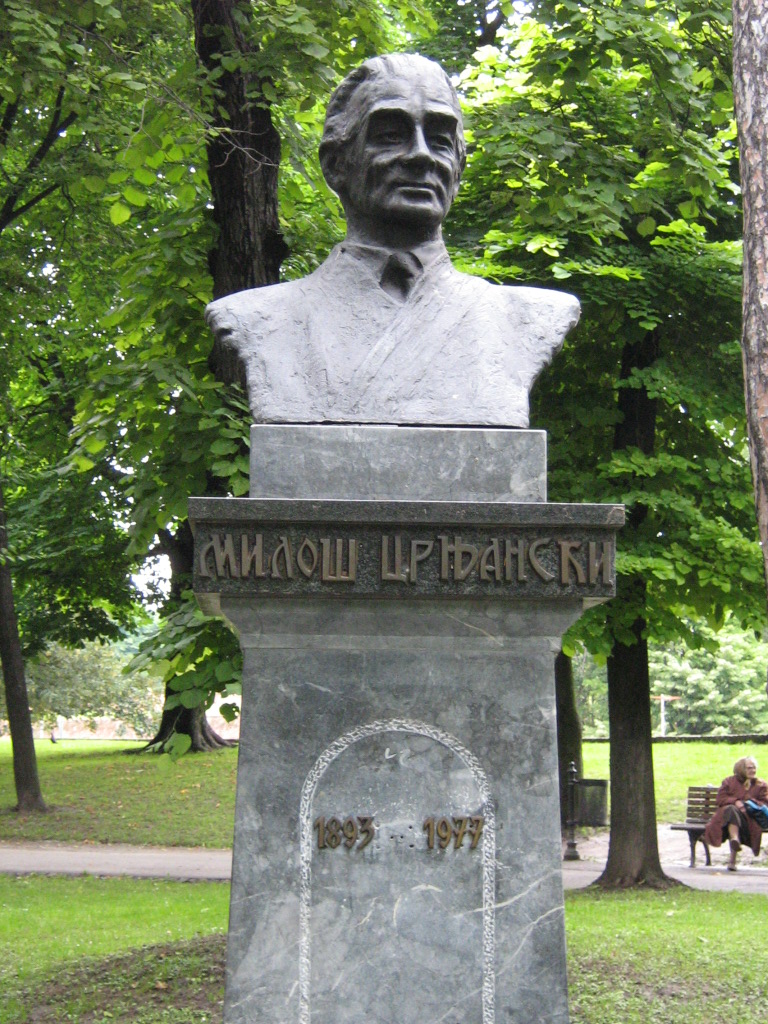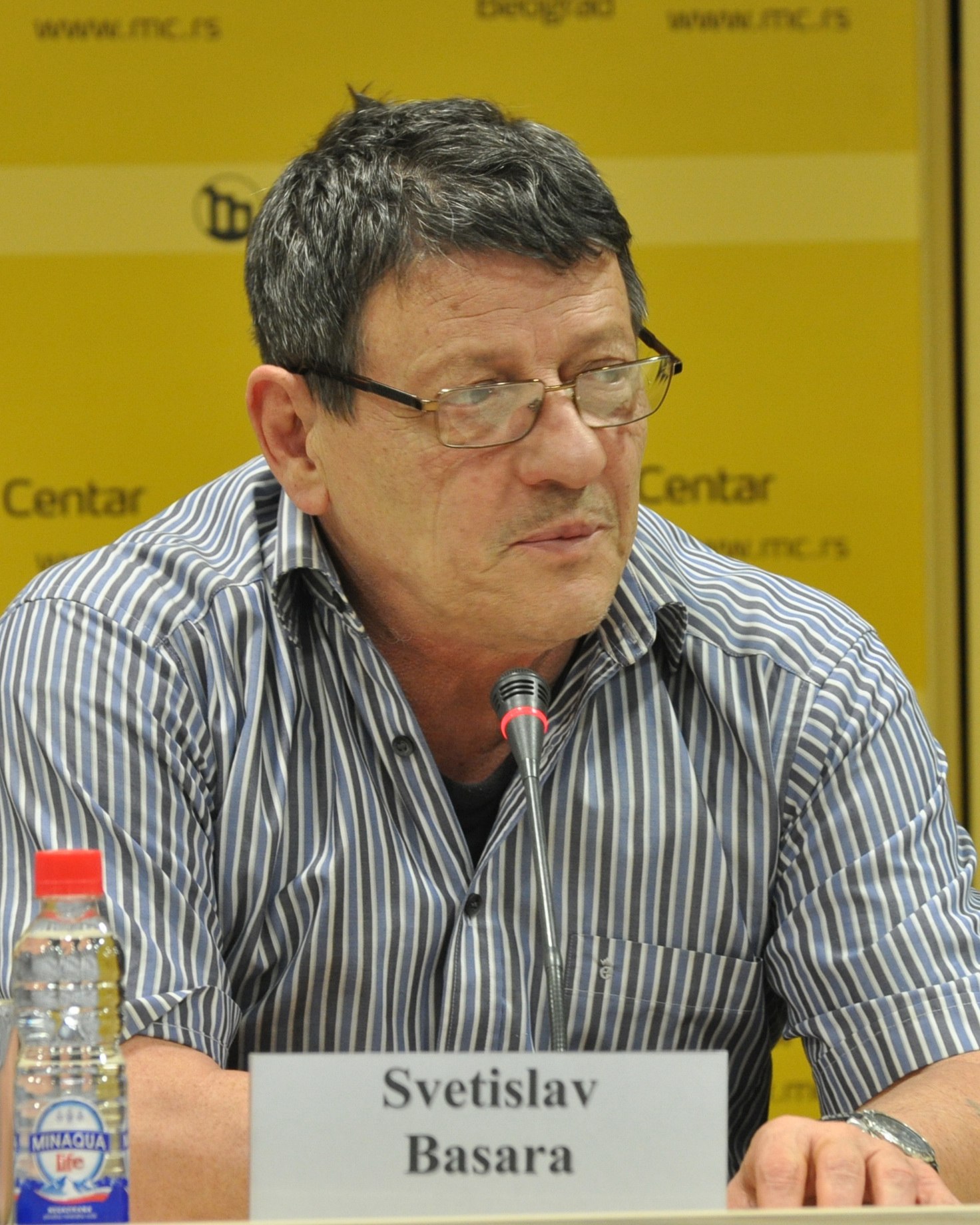|
Miloš Crnjanski
Miloš Crnjanski ( sr-Cyrl, Милош Црњански, ; 26 October 1893 – 30 November 1977) was a Serbian writer and poet of the expressionist wing of Serbian modernism, author, journalist and a diplomat. Biography Crnjanski was born in Csongrád (modern-day Hungary), to an impoverished family which moved in 1896 to Temesvár (modern-day Timișoara, Romania). He completed the elementary school in Pancsova (today Pančevo, Serbia), and Grammar school in Temesvár. Then he started attending the export academy in Fiume (today Rijeka, Croatia) in 1912, and in the autumn of the following year he started studying mathematics and philosophy in Vienna. At the beginning of World War I, Crnjanski was persecuted as part of the general anti-Serbian retribution of Austria to Princip's assassination in Sarajevo. Instead of being sent to jail, he was drafted to the Austro-Hungarian Army and sent to Galician front to fight against the Russians – where he was wounded in 1915. Crnjanski ... [...More Info...] [...Related Items...] OR: [Wikipedia] [Google] [Baidu] |
Csongrád
Csongrád (; , archaically also ''Црноград/Crnograd,'' ) is a town in Csongrád County in southern Hungary. History At the time of the Hungarian Conquest (the end of 9th century) the Maros Valley was under Bulgarian control. The fortress was known as Chorniy Grad (Slavs, Slavic term for 'black castle') and served as a Bulgarian-Slavic guard outpost. Later King Saint Stephen of Hungary, Stephen (1000–1038) made the town a state administration center, giving its name to a county. It remained a county seat till the Mongol invasion of Hungary (1240–42). The town and fortress were badly damaged by the Mongols; king Béla IV subsequently transferred the county seat to Szeged in 1247. The move significantly affected Csongrád's recovery. It did not become a town again until 1920. Main sights The Main Square obtained its definitive shape in the first half of the 10th century, its streets are wide with many trees. The Main Street is lined by old plane trees. The road runni ... [...More Info...] [...Related Items...] OR: [Wikipedia] [Google] [Baidu] |
Socialist Republic Of Serbia
The Socialist Republic of Serbia ( sh-Cyrl-Latn, separator=" / ", Социјалистичка Република Србија, Socijalistička Republika Srbija), previously known as the People's Republic of Serbia ( sh-Cyrl-Latn, separator=" / ", Народна Република Србија, Narodna Republika Srbija, National Republic of Serbia), commonly abbreviated as Republic of Serbia, SR Serbia or simply Serbia, was one of the six Constituent republics of the Socialist Federal Republic of Yugoslavia, constituent republics of the Socialist Federal Republic of Yugoslavia in what is now the modern day states of Serbia and the disputed territory of Kosovo. Its formation was initiated in 1941, and achieved in 1944–1946, when it was established as a federated republic within Yugoslavia. In that form, it lasted until the constitutional reforms from 1990 to 1992, when it was reconstituted, as the Republic of Serbia (1992–2006), Republic of Serbia within the Federal Republic of ... [...More Info...] [...Related Items...] OR: [Wikipedia] [Google] [Baidu] |
NIN Award
The ''NIN'' Award (, Нинова награда), officially the Award for Best Novel of the Year, is a prestigious Serbian (and previously Yugoslavian) literary award established in 1954 by the NIN (magazine), ''NIN'' weekly and is given annually for the best newly published novel written in Serbian language, Serbian (previously in Serbo-Croatian).B92''Grozdani Olujić NIN-ova nagrada'' (NIN Prize to Grozdana Olujić), 15 Jan 2010 The award is presented every year in January by a panel of writers and critics. In addition to being a highly acclaimed award capable of transforming writers' literary careers, the award is also sought after because it virtually assures bestseller status for the winning novel. The literary website ''complete review'' called it the "leading Serbian literary prize" in 2012. Between 1954 and 1957, the award was given to the best novel published in Yugoslavia, regardless of the language, but all the novels awarded in this period were written in Serbo-Cro ... [...More Info...] [...Related Items...] OR: [Wikipedia] [Google] [Baidu] |
Kingdom Of Yugoslavia
The Kingdom of Yugoslavia was a country in Southeast Europe, Southeast and Central Europe that existed from 1918 until 1941. From 1918 to 1929, it was officially called the Kingdom of Serbs, Croats, and Slovenes, but the term "Yugoslavia" () has been its colloquial name as early as 1922 due to its origins. "Kraljevina Jugoslavija! Novi naziv naše države. No, mi smo itak med seboj vedno dejali Jugoslavija, četudi je bilo na vseh uradnih listih Kraljevina Srbov, Hrvatov in Slovencev. In tudi drugi narodi, kakor Nemci in Francozi, so pisali že prej v svojih listih mnogo o Jugoslaviji. 3. oktobra, ko je kralj Aleksander podpisal "Zakon o nazivu in razdelitvi kraljevine na upravna območja", pa je bil naslov kraljevine Srbov, Hrvatov in Slovencev za vedno izbrisan." (Naš rod ("Our Generation", a monthly Slovene language periodical), Ljubljana 1929/30, št. 1, str. 22, letnik I.) The official name of the state was changed to "Kingdom of Yugoslavia" by King Alexander I of Yugosla ... [...More Info...] [...Related Items...] OR: [Wikipedia] [Google] [Baidu] |
Miloš Crnjanski And Member Of Yugoslav Embassy In Italy, Rome, 1939
Miloš, Milos, Miłosz or spelling variations thereof is a mainly male Slavic given name and a surname. It may refer to: Given name Sportsmen * Miłosz Bernatajtys, Polish rower * Miloš Bogunović, Serbian footballer * Miloš Budaković, Serbian footballer * Miloš Ćuk, Serbian water polo player, Olympic champion * Miloš Dimitrijević, Serbian footballer * Miloš Đelmaš, Serbian footballer * Miloš Holuša, Czech race walker * Miloš Jojić, Serbian footballer * Miloš Korolija, Serbian water polo player * Miloš Krasić, Serbian footballer * Miloš Marić, Serbian footballer * Miloš Milošević, Croatian swimmer * Miloš Milutinović, Serbian footballer and manager * Miloš Nikić, Serbian volleyball player * Miloš Ninković, Serbian footballer * Miloš Pavlović (racing driver), Serbian racing driver * Milos Raonic, Montenegrin-born Canadian tennis player * Miloš Stanojević (rower), Serbian rower * Miloš Šestić, Serbian footballer * Miloš Teodos ... [...More Info...] [...Related Items...] OR: [Wikipedia] [Google] [Baidu] |
Vreme
is a weekly news magazine based in Belgrade, Serbia. History In 1990, dissatisfied with the media climate in SR Serbia, SFR Yugoslavia's largest constituent unit, a group of liberal Serbian intellectuals, including prominent lawyer Srđa Popović, decided to start a weekly news magazine. Following a seven-month preparation throughout the year, ''Vreme'' was launched with its first issue coming out on 29 October 1990, a little over a month before the 1990 general election in SR Serbia as the entire country of SFR Yugoslavia was transforming its governance from a one-party system under the Yugoslav Communist League (SKJ) to a multi-party one. Most of ''Vremes original staff were journalists from ''Politika'' and '' NIN''. It characterizes itself as "a magazine without lies, hatred, or prejudice" and opposed nationalistic mobilization for the Yugoslav wars.Gordy, Eric D. (1999). ''The Culture of Power in Serbia: Nationalism and the Destruction of Alternatives''. p. 69. Penn Stat ... [...More Info...] [...Related Items...] OR: [Wikipedia] [Google] [Baidu] |
Politika
( sr-Cyrl, Политика, lit=Politics) is a Serbian daily newspaper, published in Belgrade. Founded in 1904 by Vladislav F. Ribnikar, it is the oldest daily newspaper still in circulation in the Balkans. Publishing and ownership is published by Politika novine i magazini (PNM), a joint venture between Politika a.d. and East Media Group. The current director of PNM is Mira Glišić Simić. PNM also publishes: *''Sportski žurnal'' *''Politikin Zabavnik'' *''Svet kompjutera'' *''Ilustrovana Politika'' *''Bazar'' History Since its launch in January 1904, was published daily, except for several periods: *Due to World War I, there were no issues from 14 November 1914 to 21 December 1914, and again from 23 September 1915 to 1 December 1919. *Due to World War II, there were no issues from 6 April 1941 to 28 October 1944. *In protest against the government's intentions to turn into a state-owned enterprise, a single issue was not published in the summer of 1992. The launc ... [...More Info...] [...Related Items...] OR: [Wikipedia] [Google] [Baidu] |
Russian Empire
The Russian Empire was an empire that spanned most of northern Eurasia from its establishment in November 1721 until the proclamation of the Russian Republic in September 1917. At its height in the late 19th century, it covered about , roughly one-sixth of the world's landmass, making it the list of largest empires, third-largest empire in history, behind only the British Empire, British and Mongol Empire, Mongol empires. It also Russian colonization of North America, colonized Alaska between 1799 and 1867. The empire's 1897 census, the only one it conducted, found a population of 125.6 million with considerable ethnic, linguistic, religious, and socioeconomic diversity. From the 10th to 17th centuries, the Russians had been ruled by a noble class known as the boyars, above whom was the tsar, an absolute monarch. The groundwork of the Russian Empire was laid by Ivan III (), who greatly expanded his domain, established a centralized Russian national state, and secured inde ... [...More Info...] [...Related Items...] OR: [Wikipedia] [Google] [Baidu] |
Galicia (Central Europe)
Galicia may refer to: Geographic regions * Galicia (Spain), a region and autonomous community of northwestern Spain ** Gallaecia, a Roman province ** The post-Roman Kingdom of the Suebi, also called the Kingdom of Gallaecia ** The medieval Kingdom of Galicia ** The Republic of Galicia, which only lasted for a few hours on 27 June 1931 * Galicia (Eastern Europe), a historical region in southeastern Poland and western Ukraine ** The Kingdom of Galicia–Volhynia or Kingdom of Rus, a medieval kingdom ** The Kingdom of Galicia and Lodomeria, a crown land of the Austrian Empire and later the Austrian half (Cisleithania) of Austria-Hungary ** West Galicia or New Galicia, a short-lived administrative region of the Austrian Empire, eventually merged into the Kingdom of Galicia and Lodomeria ** The District of Galicia, part of the Nazi General Government during the World War II occupation of Poland Named after Spanish Galicia * Galicia, Aklan, a barangay in Panay, Philippines * Nuev ... [...More Info...] [...Related Items...] OR: [Wikipedia] [Google] [Baidu] |
Austro-Hungarian Army
The Austro-Hungarian Army, also known as the Imperial and Royal Army,; was the principal ground force of Austria-Hungary from 1867 to 1918. It consisted of three organisations: the Common Army (, recruited from all parts of Austria-Hungary), the Imperial-Royal Landwehr (recruited from Cisleithania) and the Royal Hungarian Honvéd (recruited from Transleithania). In the wake of fighting between the Austrian Empire and the Kingdom of Hungary and the subsequent two decades of uneasy co-existence, Hungarian troops served either in ethnically mixed units or were stationed away from Hungarian regions. With the Austro-Hungarian Compromise of 1867, the Austro-Hungarian Army was brought into being. It existed until the disestablishment of Austria-Hungary in 1918 following the end of World War I. Common Army units were generally poorly trained and had very limited access to new equipment, because the governments of the Austrian and Hungarian parts of the empire often preferred to ge ... [...More Info...] [...Related Items...] OR: [Wikipedia] [Google] [Baidu] |
Assassination In Sarajevo
The assassination of Archduke Franz Ferdinand was one of the key events that led to World War I. Archduke Franz Ferdinand of Austria, heir presumptive to the Austro-Hungarian throne, and his wife, Sophie, Duchess of Hohenberg, were assassinated on 28 June 1914 by Bosnian Serb student Gavrilo Princip. They were shot at close range while being driven through Sarajevo, the provincial capital of Bosnia and Herzegovina, formally annexed by Austria-Hungary in 1908. Princip was part of a group of six Bosnian assassins together with Muhamed Mehmedbašić, Vaso Čubrilović, Nedeljko Čabrinović, Cvjetko Popović and Trifko Grabež coordinated by Danilo Ilić; all but one were Bosnian Serbs and members of a student revolutionary group that later became known as Young Bosnia. The political objective of the assassination was to free Bosnia and Herzegovina of Austria-Hungarian rule and establish a common South Slav (" Yugoslav") state. The assassination precipitated the July Crisis ... [...More Info...] [...Related Items...] OR: [Wikipedia] [Google] [Baidu] |



